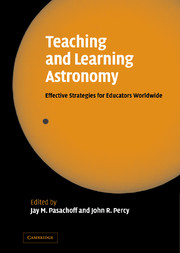Book contents
- Frontmatter
- Contents
- List of illustrations
- Preface
- Introduction
- Part I Astronomy in the curriculum around the world
- Part II Astronomy education research
- Part III Educating students
- Part IV Educating teachers
- Part V Astronomy and pseudoscience
- Part VI Astronomy and culture
- Part VII Astronomy in developing countries
- Part VIII Public outreach in astronomy
- Part IX The education programs of the International Astronomical Union
- Part X Conclusions
- Author index
- Subject index
Introduction
Published online by Cambridge University Press: 18 May 2010
- Frontmatter
- Contents
- List of illustrations
- Preface
- Introduction
- Part I Astronomy in the curriculum around the world
- Part II Astronomy education research
- Part III Educating students
- Part IV Educating teachers
- Part V Astronomy and pseudoscience
- Part VI Astronomy and culture
- Part VII Astronomy in developing countries
- Part VIII Public outreach in astronomy
- Part IX The education programs of the International Astronomical Union
- Part X Conclusions
- Author index
- Subject index
Summary
The quantity and quality of the astronomy that is taught in our schools has a critical impact on the health of astronomy. It affects the recruitment and training of future astronomers. It affects the awareness, understanding, and appreciation of astronomy by the citizens who, as taxpayers and decision-makers, support our work. They form the society and culture within which we operate. In many countries, astronomy does not appear in the school curriculum at all; in other countries, it has a place in the curriculum, but the curriculum may be flawed, or teachers may have neither the training nor the resources to present it effectively. Much is known about effective teaching and learning of astronomy. Very little of this knowledge is implemented in schools and universities. Rather, teaching may be ineffective; it may sometimes intensify misconceptions, and may create an incorrect or negative impression of our subject.
Yet we live in a golden age of astronomy. In the last half-century, astronomers have explored dozens of planets and moons in our solar system, and astronauts have set foot on one moon - ours. Astronomers have discovered over a hundred planets around other stars. They have learned much about the life cycle of stars, including their bizarre end products - white dwarfs, neutron stars, and black holes. On a wider scale, they have mapped the universe of galaxies and, in the twenty-first century, they have determined the age, shape, and composition of the universe with unprecedented accuracy. We have begun to understand our cosmic roots: the origin of our universe, our galaxy, our star, and our planet, and of the atoms and molecules of life.
Information
- Type
- Chapter
- Information
- Teaching and Learning AstronomyEffective Strategies for Educators Worldwide, pp. 1 - 4Publisher: Cambridge University PressPrint publication year: 2005
